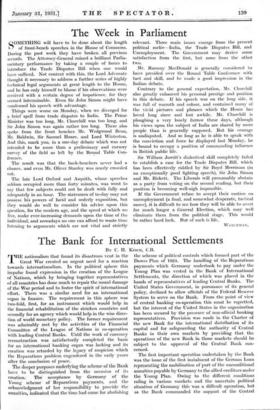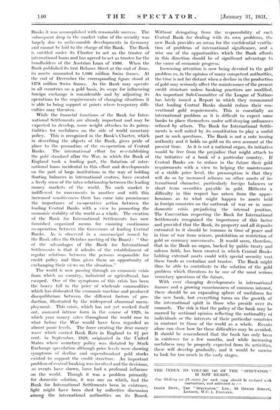The Bank for International Settlements BY C. H. KIscu, C.B.
THE nationalism that found its disastrous vent in the Great War created an urgent need for a reaction towards internationalism. In the political sphere this impulse found expression in the creation of the League of Nations, which by bringing together representatives of all countries has done much to repair the moral damage of the War period and to foster the spirit of international effort. There was a similar need for an international organ in finance. The requirement in this sphere was two-fold, first, for an instrument which would help in the financial rehabilitation of the stricken countries and secondly for an agency which would help in the wise direc- tion of world monetary policy. The former requirement was admirably met by the activities of the Financial Committee of the League of Nations in co-operation with leading Central Banks. Until the work of currency reconstruction was satisfactorily completed the basis for an international banking organ was lacking and its creation was retarded by the legacy of suspicion which the Reparations problem engendered in the early years after the conclusion of peace.
The deeper purposes underlying the scheme of the Bank have to be distinguished from the occasion of its creation. The acceptance by Germany of the Young scheme of Reparations payments, and the acknowledgment of her responsibility to provide- the annuities, indicated that the time had come for abolishing the scheme of political controls which formed part of the Dawes Plan of 1924. The handling of the Reparations payments which Germany undertook to pay under the Young Plan was vested in the Bank of International Settlements, the direction of which was placed in the hands of representatives of leading Central Banks. The United States Government, in pursuance of its general policy, declined to allow officials of the Federal Reserve System to serve on the Bank. From the point of view of central banking co-operation this must be regretted, but the interest of the United States in the organization has been secured by the presence of non-official banking representatives. Provision was made in the Charter of the new Bank for the international distribution of its capital and for safeguarding the authority of Central Banks in their own markets by providing that the operations of the new Bank in those markets should be subject to the approval of the Central Bank con- cerned.
The first important operation undertaken by the Bank was the issue of the first instalment of the German Loan representing the mobilisation of part of the unconditional annuities payable by Germany to the allied creditors under the Young Plan. Owing to the different conditions ruling in various markets and the uncertain political situation of Germany this was a difficult operation, bid as the Bank commanded the support of the Central Banks it was accomplished with reasonable success. The subsequent drop in the market value of the security was largely due to unfavourable developments in Germany and cannot he laid to the charge of the Bank. The Bank is entitled under its Charter to act as the trustee of international loans and has agreed to act as trustee for the bondholders of the Austrian Loan of 1980. When the Bank published its first Balance Sheet at the end of June, its assets amounted to 1,086 million Swiss francs. • At the end of December the corresponding figure stood at 1578 million Swiss francs. As the Bank may operate in all countries on a gold basis, its scope for influencing foreign exchange is considerable and by adjusting its operations to the requirements of changing situations it is able to bring support at points where temporary diffi- culties may threaten.
While the financial functions of the Bank for Inter- national Settlements are already important and may be expected to develop, more weight attaches to its poten- tialities for usefulness on the side of world monetary policy. This is recognized in the Bank's Charter, which in describing the objects of the Bank, gives pride of place to the promotion of the co-operation of Central Banks. The international effort for re-establishing the gold standard after the War, in which the Bank of England took a leading part, the flotation of inter- national loans incidental to this effort and developments on the part of large institutions in the way of holding floating balances in international centres, have created a lively sense of the inter-relationship between the leading money markets of the world. No such market is indifferent to movements in another and with this increased sensitiveness there has come into prominence the importance of co-operative action between the leading Central Banks with a view to promoting the economic stability of the world as a whole. The creation of the Bank for International Settlements has now furnished organized means for ensuring continuous co-operation between the Governors of leading Central Banks. As is observed in a communiqué issued by the Bank after the October meeting of the Board : " One of the advantages of the Bank for International Settlements is that it admits of the establishment of regular relations between the persons responsible for credit policy and thus gives them an opportunity of exchanging their views on the situation."
The world is now passing through an economic crisis from which no country, industrial or agricultural, has escaped. One of the symptoms of this crisis has been the heavy fall in the price of wholesale commodities which has dislocated the economic machine and produced diseqUilibrium between the different factors of pro- duction, illustrated by the widespread abnormal unem- ployment. This crisis, which has not yet worked itself out, assumed intense form in the course of 1929, in which year money rates throughout the world rose to what before the War would have been regarded as almost panic levels. The force creating the dear money wave which carried Bank Rate in England to 6f per cent. in September, 1929, originated in the United States where monetary policy was dictated by Stock Exchange speculation although price levels were showing symptoms of decline and superabundant gold stocks existed to support the credit structure. An important problem of central banking was involved and the decisions, as events have shown, have had a profound influence on the world. Though it was a problem primarily for domestic solution, it was one on which, had the Bank for International Settlements been in existence, light might have been shed by collective discussion among the international authorities on its Board. Without derogating from the responsibility of each Central Bank for dealing with its own problems, the new Bank provides an arena for the confidential ventila- tion of problems of international significance, and a wise use of the opportunities which the Bank affords in this direction should be of significant advantage to the cause of economic progress.
Increasing attention is now being devoted to the gold problem as, in the opinion of many competent authorities, the time is not far distant when a decline in the production of gold may seriously affect the maintenance of the present credit structure unless banking practices are modified. An important Sub-Committee of the League of Nations has lately issued a Report in which they recommend that leading Central Banks should reduce their con- ventional gold requirements. This is essentially an international problem as it is difficult to expect some banks to place themselves under self-denying ordinances refused by others. The Bank for International Settle- ments is well suited by its constitution to play a useful part in such questions. The Bank is not a note issuing authority and it holds no gold on its own account at the present time. As it is not a national organ, its initiative would be free from the prejudice that might attach to the initiative of a bank of a particular country. If Central Banks are to reduce in the future their gold requirements with a view to helping the maintenance of a stable price level, the presumption is that they will do so by increased reliance on other assets of 'in- ternational character, particularly foreign balances or short term securities payable in gold. Hitherto a' difficulty in this respect has arisen from the appre- hensions as to what might happen to assets held in foreign countries on the outbreak of war or in some domestic crisis prejudicing the internal positioh. The Convention respecting the Bank for International Settlements recognized the importance of this factor and provided that the Bank, its property and all deposits entrusted to it should be immune in time of peace and in time of war from seizure, prohibition or restriction of gold or currency movements. It would seem, therefore, that in the Bank an organ, backed by public treaty and solemn faith, has been created in which Central Banks holding external assets could with special security vest these funds as custodian and trustee; The Bank might thus be able to contribute to the solution of the gold problem which threatens to be one of the most serious monetary questions of the future.
With ever changing developments in international finance and a growing consciousness of common interest," there should be an expanding sphere of usefulness for the new bank, but everything turns on the growth of the international spirit in those who preside over its counsels. The risk is that the policy of the bank may be marred by sectional opinion reflecting the nationality of individuals or the interests of their particular countries in contrast to those of the world as a whole. Events alone can show how far these difficulties may be avoided. It should be remembered that the bank has only been in existence for a few months, and while increasing usefulness may be properly expected from its activities, these will develop gradually, and it would be unwise to look for too much in the early stages.







































 Previous page
Previous page